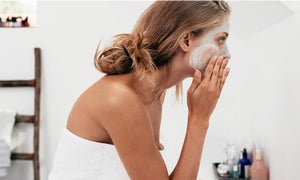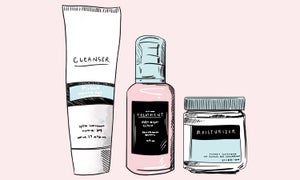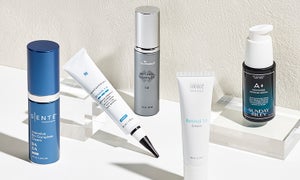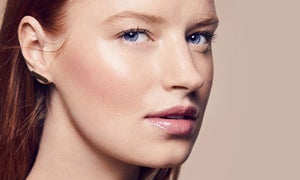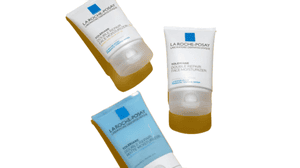
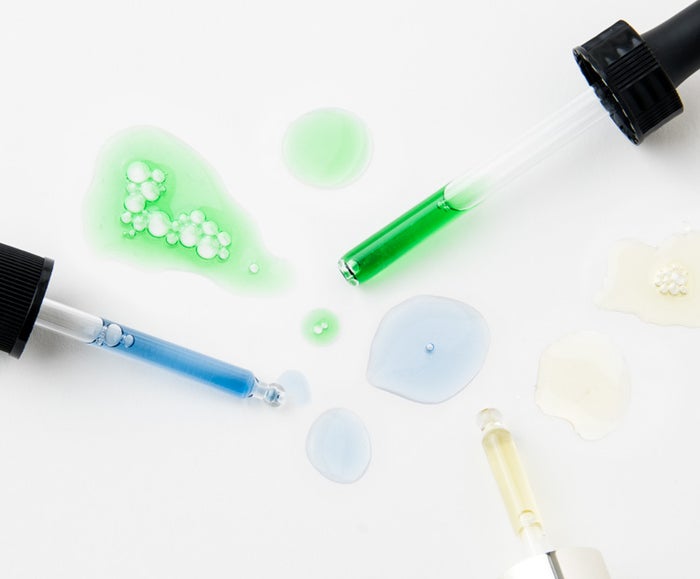
As we age, anti-aging becomes a major focus in our beauty regimens. After all, many of us want to ensure that we don’t just look our best, but are our healthiest—and what better way to do so than adopt a regimen that ensures a healthy-looking complexion?
With that said, anti-aging skin care isn’t just reserved for mature skin types. As it turns out, you’re never too young to start thinking about preventative measures. “The younger we start with preventative care, the less work we will have to do as we age,” says board-certified New York dermatologist, Dr. Debra Jaliman. Preventative skin care routines are about more than just creams and serums—they’re also about lifestyle choices. After all, as we get older, age amounts to a fraction of skin health, and habits such as smoking and not getting enough sleep can result in premature wrinkles and more.
From kicking bad habits to adding powerful ingredients to your product arsenal, we’ve got everything you need to start an anti-aging skin care regimen at any age, ahead.
1. Exfoliate to slough off dry skin
Looking for an effective way to prevent premature signs of aging and promote healthier-looking skin? Dr. Jaliman says to exfoliate. “Exfoliating is very important—it’s the first step to a preventative skin care routine. Exfoliate to get rid of dry, flaky skin [and] rejuvenate and brighten the skin,” Dr. Jaliman explains. “Regular exfoliation will help with any sun damage or skin discoloration and [it] will also allow for products to penetrate deeper into the skin,” she adds. You can incorporate exfoliation into your routine in a number of ways, including dry brushing and sugar scrubs along with chemical exfoliants such as AHA acids.
Try: Obagi360 Exfoliating Cleanser
2. Sleep on a silk pillowcase
Silk pillowcases are all the rage right now—and for good reason. Not only do they give us an excuse to go to bed early, but they also help prevent some common skin care woes, too. “It is important to sleep on a satin pillowcase so that the skin doesn’t crunch and sleep lines don’t form,” Dr. Jaliman advises. “This helps to keep the skin looking bright and well rested”; on top of that, silk won’t steal your expensive anti-aging products from your skin. A good night’s sleep and more product for the complexion? Yes, please!
3. Never go without sunscreen
Even in the dead of winter, sunscreen is a must-have preventative skin care item. So much so that Dr. Doft recommends adding the product to your routine when you’re a baby! Sunscreen is best known for its ability to prevent sunburns (if used correctly), but that’s not the only thing it’s good for. Since it literally can shield your complexion from the sun, it can protect the skin from harmful UVA and UVB rays that lead to sun damage (we see you, sunspots!), wrinkles and other premature signs of aging.
Try: EltaMD UV Clear Broad-Spectrum SPF 46
4. Moisturize with hyaluronic acid
Using moisturizer at any age can help keep skin ultra-soft and supple. That said, Dr. Doft suggests upping the ante in your 20s. “You want to keep your skin hydrated by using a great moisturizer with hyaluronic acid, which will lock in water,” explains Doft. Water retention plays a big part in hydrating the skin, so using a moisturizer formulated with an ingredient known to do so can help prevent dry skin and leave the complexion with a youthful-looking glow. In addition, it can “make fine lines less noticeable,” according to Dr. Jaliman.
Try: SkinMedica Rejuvenative Moisturizer
5. Add vitamin A and C to your regimen
As we age, our preventative skin care routine should start to evolve. With that in mind, Dr. Doft has the ultimate game plan for your late-twenties and 30s. “As you approach your 30s, it is great to start using vitamin A (retinol) and C, which will help brighten your skin, catch free radicals and stimulate collagen formation,” she explains. Thanks to their popularity, you can find vitamin A and C in a host of beauty products such as serums, creams and even face masks. Once you reach your 40s (and beyond), Dr. Doft recommends considering “an over-the-counter prescription-strength retinol.” Before making the switch, be sure to discuss it with your dermatologist.
When using retinol in your regimen, it’s important to consider the potential side effects. “Always use a broad spectrum sunscreen above SPF 30 when using retinol,” says Dr. Jaliman. “Using retinol can make your skin more sun sensitive [and it] should be used at night only,” she notes. In addition to sun protection, expecting mothers should err on the side of caution. “It is unclear if topical retinol is dangerous during pregnancy,” says Dr. Doft. “Oral retinol has been shown to lead to birth defects. I would avoid any products with retinol during pregnancy,” she adds.
Try: SkinCeuticals Retinol 0.5 Refining Night Cream
6. Apply eye cream at night
Speaking of retinol, Dr. Jaliman suggests using an eye cream formulated with the powerful anti-ager at night. “Using an eye cream with retinol is a good idea if you’re trying to reduce the appearance of fine lines and wrinkles or trying to prevent any future ones,” she explains. “Retinol stimulates a quicker renewal of skin cells. When someone uses retinol, the outer layer of the skin is sloughed off and the newer skin underneath is revealed,” she explains. Eye cream, in general, can make for an excellent preventative skin care product, as it tends to be thicker than a regular moisturizer and can provide targeted nourishment to the delicate skin around the eyes.
Try: Replenix Eye Repair Cream
7. Look out for acne-fighting ingredients
When we think of preventative skin care, we automatically think of wrinkles and other premature signs of aging. However, that’s not the only thing that can prevent skin from looking healthier and more youthful—acne can, too. For those with acne-prone skin, you might want to consider adding acne-fighting products with salicylic acid or benzoyl peroxide. “Use a gentle exfoliating scrub with ingredients such as salicylic acid to remove extra dirt and oils from your skin,” Dr. Jaliman suggests. “This helps to reduce the amount of dead skin that clogs pores. If you have acne-prone skin, you should look for certain ingredients or keywords in labels, [like] glycolic acid, salicylic acid, aloe oil-free [and] non-comedogenic,” she advises.
Try: Eminence Organic Skin Care's Acne Advanced Clarifying Masque
Preventative skin care is all about adding in the right products and ingredients. That said, there are some to be cautious of and others to avoid altogether. Not to mention: Mixing some of the above suggestions can be disastrous. We share the precautions to consider, below.
8. Quit smoking
Judging by our intro, you probably knew this was coming. While kicking your smoking habits to the curb can benefit the body in more ways than one, it can particularly help in the preventative skin care department too. “Do not smoke, and if you do, quit,” says Plastic Surgeon Dr. Melissa Doft, MD. “I can always spot someone who smoked when they walk into the office as they always look much older than their age,” she notes.
“Cigarette smoke decreases the blood supply to the skin, causes unnecessary wrinkles on the face and leaves skin dehydrated and dull,” Dr. Jaliman adds. Like other environmental pollutants, cigarettes are chock-full of free radicals—the pesky things we try to fight with anti-aging products—and if you smoke, you’re giving them a one-way ticket to your skin and overall health.
9. Stay hydrated
Another lifestyle change that can impact the health of your skin? Your water intake. “Drink plenty of water,” advises Dr. Jaliman. “Staying hydrated is beneficial to the skin.” The recommended daily water intake might vary depending on your sex and activity level (fun fact: The more you work out, the more water you need!), so check with your doctor if you have concerns with your water intake.”
10. Get your beauty sleep
Sleep prevents more than a bad mood. While we sleep, the skin regenerates itself, which helps it stay healthy. “Not sleeping enough is a bad habit,” Dr. Jaliman explains. “Beauty sleep is very important; I recommend that my patients sleep seven to eight hours per night.” We can all use an excuse to get more shut-eye, why not blame it on our beauty?!
In addition to lifestyle changes, there are a few skin care products and ingredients you might want to consider for a preventative skin care routine. Keep reading to find out what products and practices Dr. Jaliman and Dr. Doft swear by for healthy, youthful-looking skin.
Precautions to Note
Albeit a stellar preventative skin care ingredient, retinol can wreak havoc if not used properly—and on its own. “You should avoid mixing retinol products with products that have acids such as alpha-hydroxy (glycolic and lactic) and beta-hydroxy acids (salicylic),” Dr. Jaliman warns. “You can still use the products, but you should use them at different times. Products with acids can be used during daytime and retinol at night,” she notes. Parabens are also important to consider—and Dr. Jaliman says you should avoid them. “They are added to many products to preserve shelf life, but they can disrupt the hormones in your body,” she explains.
If you have acne, you should look for certain ingredients and words on the packaging, but also steer clear of others. “Silicone in makeup tends to cause acne,” Dr. Jaliman reveals. In addition, she suggests avoiding oils such as “almond oil and wheat germ oil” as these ingredients have the ability to clog pores when used on the face.
Those with rosacea might not benefit from the same preventative skin care ingredients and products as those with acne or dry, prematurely aging skin. “Benzoyl peroxide, which is a common ingredient used to treat acne, should be avoided by people who have rosacea, [as] it can increase inflammation,” explains Dr. Jaliman. “Glycolic acid can be found in many anti-aging products and, if you have rosacea, you should avoid it. It can burn and cause redness and peeling,” she concludes.

Jessie Quinn is a writer and editor with work published in NYLON Magazine, StyleCaster.com, Girlboss.com, Marvel.com, and more. She is a graduate of Academy of Art University with a Bachelor’s Degree in Fashion Journalism. Originally from Los Angeles, she currently resides in Brooklyn—her home for the last five years. In Jessie’s free time, you can find her creating content for her beauty blog, Hair Skin Kale, testing out DIY beauty recipes, exploring her neighborhood, or binge-watching episodes of Friends. Her background in fashion has taught her that beautiful skin never goes out of style. Follow her on Instagram.
Related Articles

